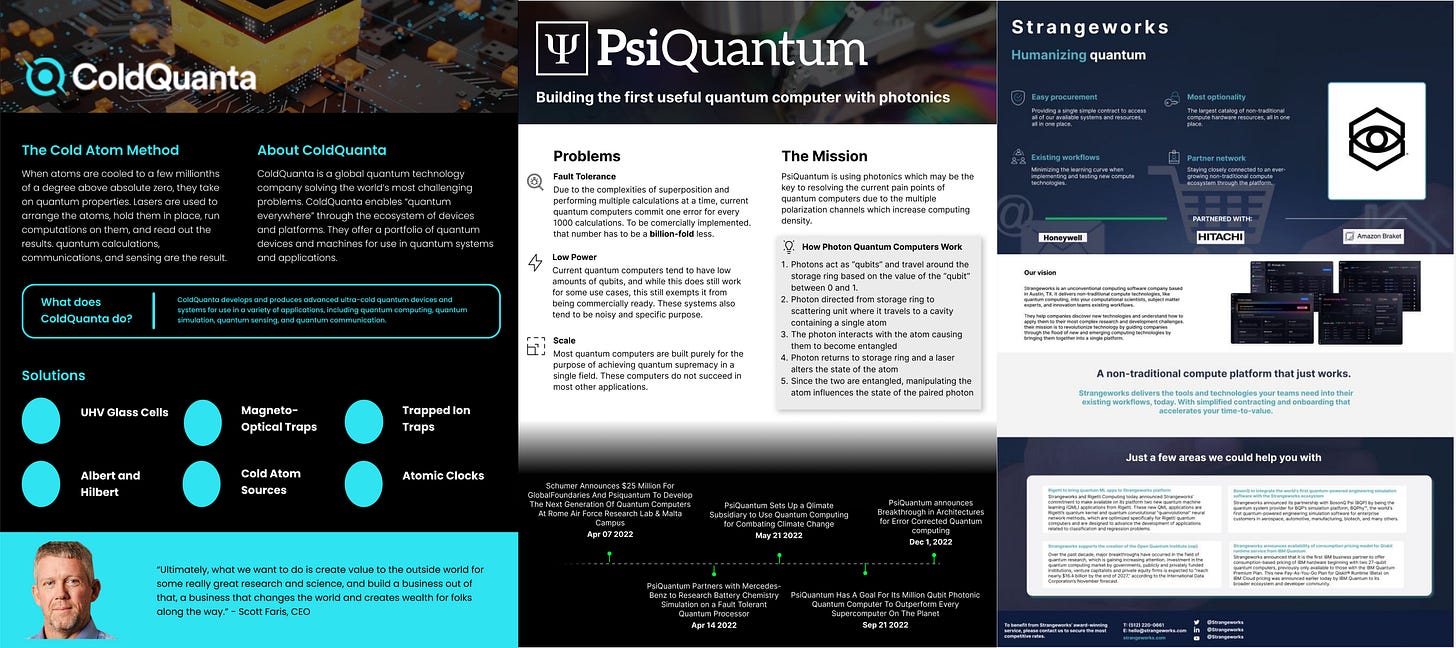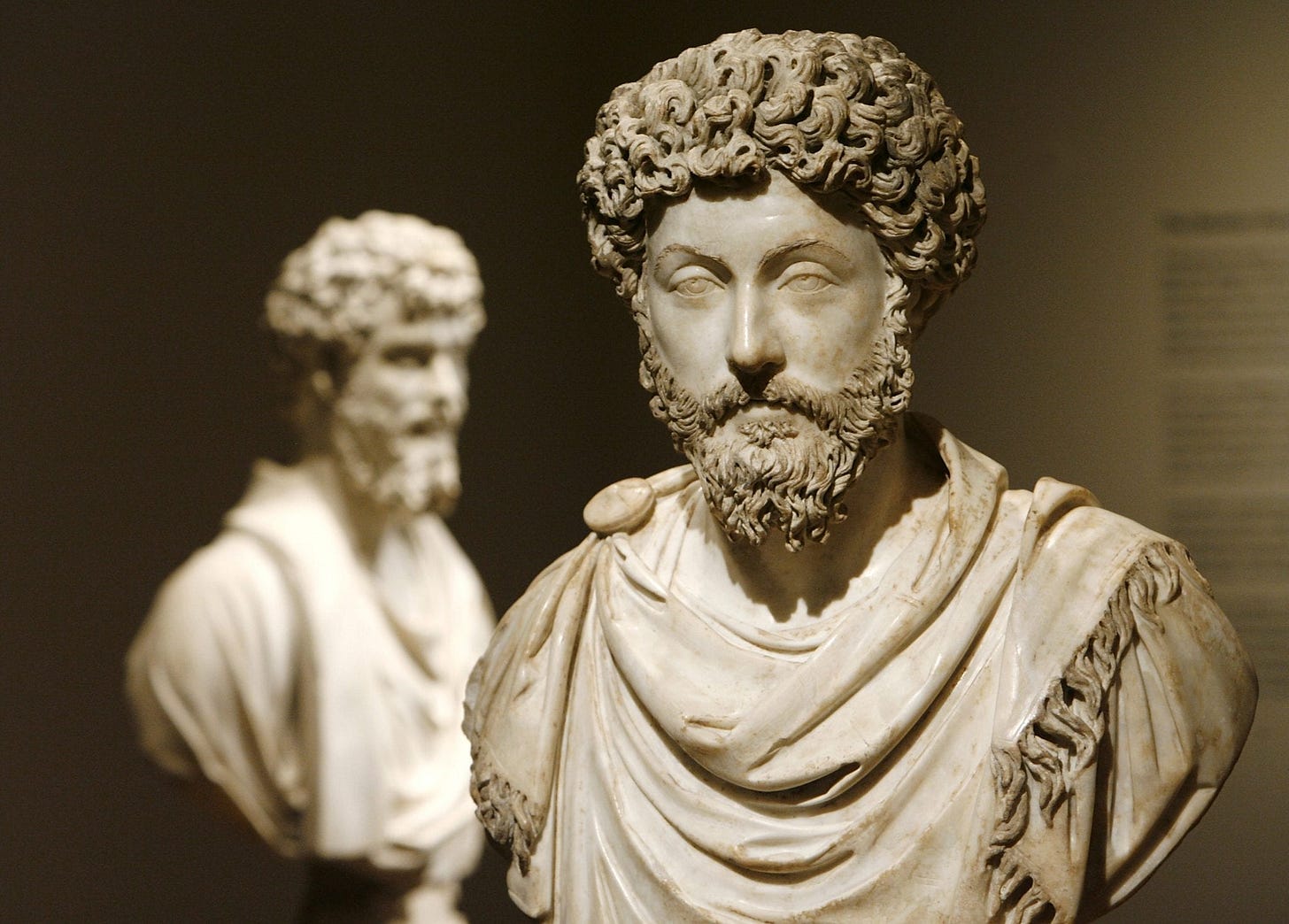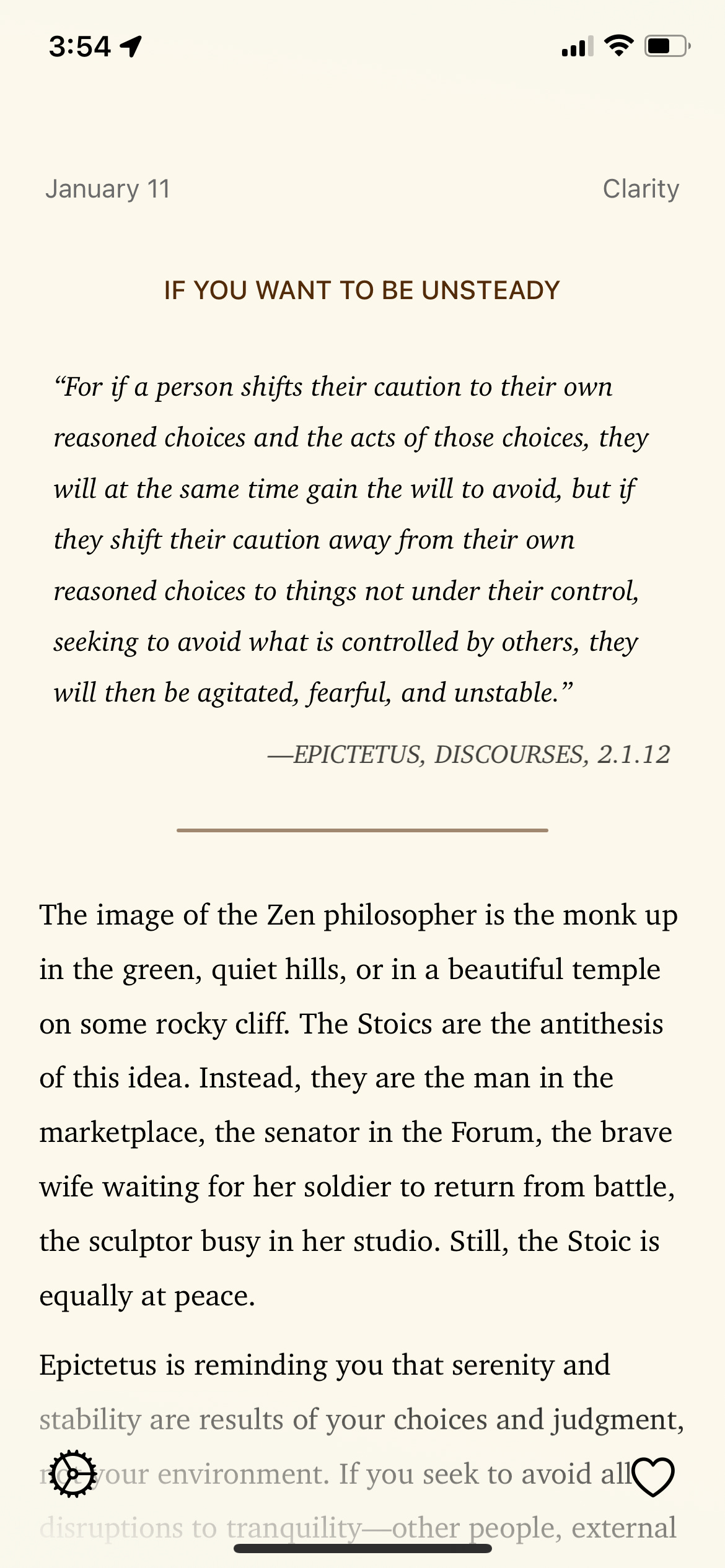Kicking off the new year with quantumania
Stoicism, Quantum Computing, and The Future.
TKS Sessions are back.
I missed it. Students brought good energy into the new year and are excited to continue on their growth trajectories. With a couple of weeks away, students are able to return with intention about where they want to focus their time and energy.
Entering the quantum realm
We did not hold back this weekend. We hit on quantum computing as our first topic of the year.
If you haven't heard, quantum computing is the next frontier in computing.

Quantum computing has the potential to unlock such immense computing power that we’ll be able to model and solve problems that have stumped humanity for years. By taking advantage of quantum physics, quantum computers will be able to discover and create new materials and even drugs. Imagine being able to simulate how your body will react to a new medical treatment ahead of time. We’ll be able to understand the climate better and 🤞🏼 hopefully create more accurate weather predictions.
Quantum computing will put more horsepower behind our machine-learning algorithms, leading to exponential growth in the accuracy and breadth of the models we are able to create. Quantum ML is already starting to happen with banks using it to better model risk and forecast various trading scenarios.
Breaking through current limitations
Classical computing (the device you're reading this on right now) operates in the world of 0s and 1s. You may have heard this before but never really internalized what that means. I know I hadn't. The best way to think about it is everything in the world can be encoded as bits using 0s and 1s. This is what we've done with computers. Through a combination of data (0s/1s) and logic gates (ways to combine or modify the data) we can create anything from a calculator to generative AI.
If you want to try to begin to grasp this, check out this video of someone who made a functioning computer in Minecraft. Think about that for a minute. A computer was made using only the blocks that exist in Minecraft. 🤯 The creativity of others astounds me.
But bits are inefficient for mass calculation. We use 8 bits to encode a single letter. Once you reach a certain scale of simulation, you would need more bits than there are atoms in the observable universe. We use transistors to model logic gates and so they often become the limiting factor as we try to squeeze an increasing number onto a chip. Historically we’ve tried making transistors smaller and smaller to be able to accommodate more operations.
You might be familiar with Moore's Law, which predicts that the number of transistors in an integrated chip roughly doubles every two years. For the last 50 years, this has held true. But many predict that we are reaching the end of Moore's Law and with it, limits on our computing power1. Each year companies like Apple, Intel, and AMD have been making smaller and smaller chips. Apple's latest chip the A16 Bionic has 16 billion transistors on it, getting down to a size of 4 nanometers. We are coming up against the physical limits of transistors; once we reach the quantum scale, particles start behaving differently and our existing transistors won’t work anymore. We need something different.
So instead of trying to create smaller transistors or bigger computers, we need a radically new approach. Enter quantum computing.

Taking advantage of the unique properties of quantum mechanics, we are able to create new types of computers using Qubits (quantum bits). Qubits are able to be used in complex calculations due to properties such as superposition, entanglement, and tunnelling. For a good introduction to Quantum Computing, check out this article by TKS student Rachel Lee.
These new computers unlock immense computing power for specific tasks. Instead of imagining a quantum-powered iPhone, think about a quantum computer designed specifically for drug discovery. Or encrypting data. Or simulating the brain. There are so many world-changing applications of quantum computing and the field is just getting started.
The more I learn about QC the more my brain hurts and the less I felt like I know. This is an incredibly complex and evolving field!
If you're curious and keen to get into quantum, you can start playing around with quantum computers RIGHT NOW! A lot of companies (Amazon, IBM, Q-CTRL) have cloud interfaces for quantum computers that you're able to run experiments on. There is nothing holding you back from learning more about the emerging field and starting to run some of your own tests or applications to learn more.
I also can’t mention quantum computing without also mentioning the fact that we get a new Antman movie (in the quantum realm) this February. 🤓
This weekend students explored some of the leading quantum computing companies and created a one-pager describing them. They looked into startups like IonQ and PsiQuantum, as well as the moves big companies like Google Quantum and IBM are making in the space. Together they designed a document that talked about some key highlights of that company.
For many of them, this was their first experience with Figma, a collaborative design tool. They were on learning double duty as they got familiar with both the tool and their quantum company at the same time. At the end of 50 minutes, many of them had created a useful document providing a high-level view of the organization and what they are working on.
This was just their first rep. It’s nothing but improvement from here.
Creating a one-pager is a key skill for anyone looking to communicate their ideas. By synthesizing information and using visual hierarchy to articulate, you're able to create impactful, memorable documents. Students will continue to practice throughout the rest of the year creating these sorts of mockups for their projects.
Embracing stoicism
Stoicism is an Ancient Greek philosophy focused on improving our mental game as we pursue various virtues such as wisdom and courage. The stoics aimed to achieve self-mastery, having control over our influences and actions, and focusing efforts on things within our control. The teachings of stoicism remind us to better understand our emotions, prepare for the worst, and pursue difficult things to build control and courage.
Stoics believed in practicing hardship and doing hard things to build resilience. Sound familiar? They understood the value of difficulty in building strength and resilience. They wanted to become indifferent to the results or situations they were put into, able to respond and adapt to anything that came their way.
Core Stoic Principles
There are 9 core Stoic beliefs according to TheDailyStoic.com:
Live According to Nature
Happiness Isn’t Found in Things, but in Virtue Alone (What We Value and the Choices We Make)
We Don’t Control External Events, We Only Control Our Thoughts, Opinions, Decisions and Duties
We’ve Each Been Given All the Inner Resources We Need to Thrive
We Must Eliminate Toxic Emotions
We Are and Must Remain a Unified Self – We Can’t Complain or Blame Anyone Else
No Man Is an Island
Our Personal Development is Bound Up in Cooperation with Others
Persist and Resist: It’s All About Progress, Not Perfection
From reading these you can sense a pattern around personal growth, focusing on what we can control, and understanding your role within a larger system. Stoics believed in the pursuit of reason and virtue as the purpose of life, in finding ways to live without extremes (feast or famine).
Life as a stoic
While I’m not trying to push this given philosophy onto anyone, nor saying I fully agree with it, I’ve personally found it a helpful toolkit for managing my own expectations and emotions. As with all things, it’s still a process for me 😂 I don’t know if any of my friends would call me stoic.
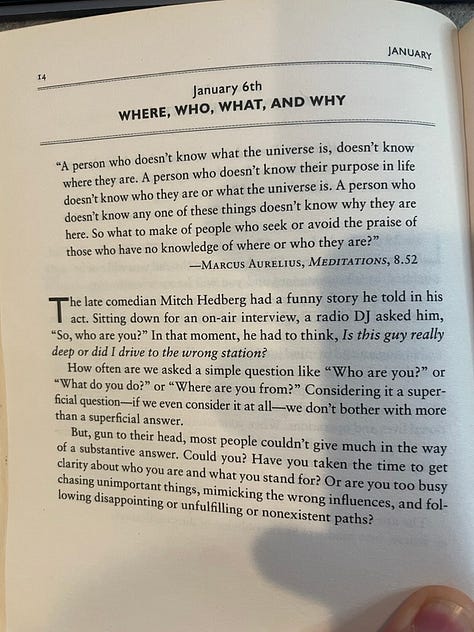
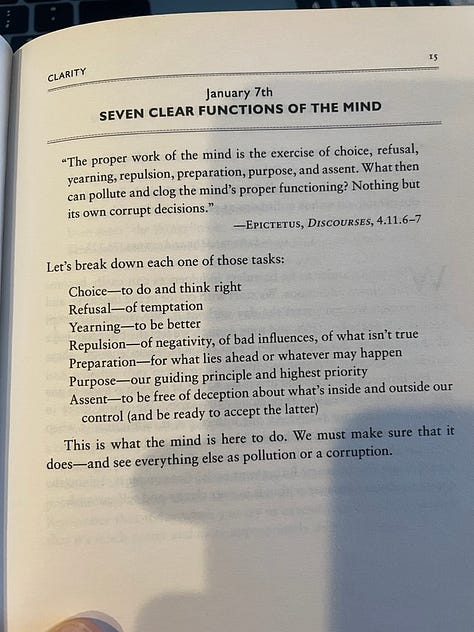
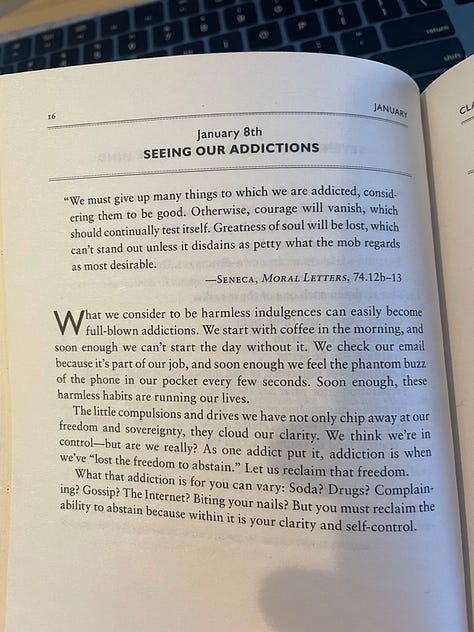
I was first exposed to Stoicism through my partner about 4-5 years ago. One of the vloggers she follows on YouTube shared a book, The Daily Stoic, that was a collection of quotes and meditations on stoicism. She bought it and for the next year, it became part of our morning ritual. One of us would read the daily passage to the other and if it sparked anything in our minds, we would discuss it a bit more.
Each morning’s reading was a helpful reminder of spending time on the things I find important. To not get caught up chasing the wrong things. To focus on the things I can control and not waste time on things I can't. While it's hard to change yourself overnight, the daily practice of reviewing stoic practices has slowly helped me adjust my own mindset.
I even ended up building myself a personal app of the book so I could have it on the go and bookmark my favourite passages. (Sorry Ryan Holiday)
Modern Stoics
Stoicism has had a mainstream come up in the last ~10 years. Mostly led by Ryan Holiday’s successful books, stoicism is being studied and shared throughout the sports and business world. Though the philosophy is thousands of years old, I think a lot of it was forgotten as we got caught up in modern life.
I haven't done much research into Stoicism through the ages, though I heard Theodore Roosevelt was a big fan of Epictetus. Lately, Stoicism has gotten a lot of attention from famous athletes, politicians, and Hollywood types such as Arnold Schwarzenegger, Brie Larson, NFL Coach Bill Belichick, and even Olympic Gold Medal Skiier Chandra Crawford. Each of them understands the power of having a strong mental game when performing at elite levels.
There are many different ways to practice stoicism for yourself, plenty has been written about it. For me, the best way to do so is to remind myself what I have control over. We cannot control what others do or feel (though we can influence it). We cannot control external events.
The one thing we can control is our actions.
So I take a look at things I’m anxious about and ask myself:
What can I do to optimize the chances of a good outcome?
What will I do in the event of a negative outcome?
And that’s it.
It’s about preparing for the crisis before the storm of emotions hit during the moment. When you have a plan, things flow easier. You acknowledge the pain and failure and start to follow what you set out to do ahead of time.
There’s a lot more to Stoicism, so if you’re curious, check out a couple of my favourite books: Meditations by Marcus Aurelius and On The Shortness of Life by Seneca.
How might you practice stoicism this week?
✌🏼
I wouldn’t count out human ingenuity yet in this space though.



